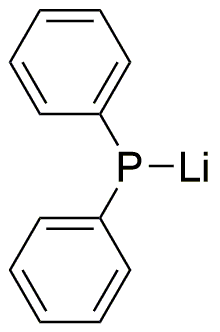Lithium diphenylphosphide is widely utilized in research focused on:
- Organic Synthesis: This compound serves as a powerful nucleophile in various organic reactions, enabling the formation of carbon-phosphorus bonds. Its application is crucial in synthesizing complex organic molecules, particularly in pharmaceutical development.
- Material Science: It is used in the development of advanced materials, including conducting polymers and organic semiconductors. Researchers leverage its properties to enhance the performance of electronic devices.
- Coordination Chemistry: Lithium diphenylphosphide acts as a ligand in coordination complexes, facilitating the study of metal-ligand interactions. This is particularly valuable in catalysis and the development of new catalysts.
- Battery Technology: The compound is explored in the field of energy storage, particularly in lithium-ion batteries, where it can improve the efficiency and stability of the electrolyte solutions.
- Research in Organophosphorus Chemistry: It plays a significant role in the synthesis and study of organophosphorus compounds, which are important in agriculture and industry for their use as pesticides and flame retardants.
General Information
Properties
Safety and Regulations
Applications
Lithium diphenylphosphide is widely utilized in research focused on:
- Organic Synthesis: This compound serves as a powerful nucleophile in various organic reactions, enabling the formation of carbon-phosphorus bonds. Its application is crucial in synthesizing complex organic molecules, particularly in pharmaceutical development.
- Material Science: It is used in the development of advanced materials, including conducting polymers and organic semiconductors. Researchers leverage its properties to enhance the performance of electronic devices.
- Coordination Chemistry: Lithium diphenylphosphide acts as a ligand in coordination complexes, facilitating the study of metal-ligand interactions. This is particularly valuable in catalysis and the development of new catalysts.
- Battery Technology: The compound is explored in the field of energy storage, particularly in lithium-ion batteries, where it can improve the efficiency and stability of the electrolyte solutions.
- Research in Organophosphorus Chemistry: It plays a significant role in the synthesis and study of organophosphorus compounds, which are important in agriculture and industry for their use as pesticides and flame retardants.
Documents
Safety Data Sheets (SDS)
The SDS provides comprehensive safety information on handling, storage, and disposal of the product.
Product Specification (PS)
The PS provides a comprehensive breakdown of the product’s properties, including chemical composition, physical state, purity, and storage requirements. It also details acceptable quality ranges and the product's intended applications.
Certificates of Analysis (COA)
Search for Certificates of Analysis (COA) by entering the products Lot Number. Lot and Batch Numbers can be found on a product’s label following the words ‘Lot’ or ‘Batch’.
*Catalog Number
*Lot Number
Certificates Of Origin (COO)
This COO confirms the country where the product was manufactured, and also details the materials and components used in it and whether it is derived from natural, synthetic, or other specific sources. This certificate may be required for customs, trade, and regulatory compliance.
*Catalog Number
*Lot Number
Safety Data Sheets (SDS)
The SDS provides comprehensive safety information on handling, storage, and disposal of the product.
DownloadProduct Specification (PS)
The PS provides a comprehensive breakdown of the product’s properties, including chemical composition, physical state, purity, and storage requirements. It also details acceptable quality ranges and the product's intended applications.
DownloadCertificates of Analysis (COA)
Search for Certificates of Analysis (COA) by entering the products Lot Number. Lot and Batch Numbers can be found on a product’s label following the words ‘Lot’ or ‘Batch’.
*Catalog Number
*Lot Number
Certificates Of Origin (COO)
This COO confirms the country where the product was manufactured, and also details the materials and components used in it and whether it is derived from natural, synthetic, or other specific sources. This certificate may be required for customs, trade, and regulatory compliance.


